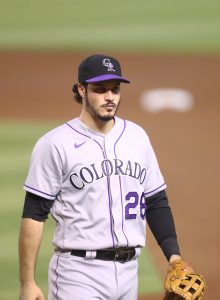The 2021 Gold Glove winners were announced tonight, with plenty of Cardinal Red to be found amidst the gold. The Cardinals became the first team to ever have five players capture Gold Gloves, underlining the tremendous all-around defensive effort that helped St. Louis reach the postseason. Ironically, the only nominated Cardinals player who didn’t win was the most decorated name of the group — nine-time winner Yadier Molina.
The A’s, Royals, Astros, and the World Series champion Braves also had multiple winners, with each club boasting two Gold Glovers. Ten of the 18 winners captured their first Gold Gloves, though some veteran winners continued to shine. The most notable of the multiple-time winners is Nolan Arenado, who becomes the 23rd player to ever win nine or more Gold Gloves in his career. Arenado still has plenty of time to continue his climb up the all-time list, yet catching 16-time winner Brooks Robinson for the all-time third base record may be a tall order even for Arenado.
Here is the full list of winners, as well as the other two nominated finalists at each position….
NL Catcher: Jacob Stallings, Pirates (1st career Gold Glove)
Yadier Molina/Cardinals, J.T. Realmuto/Phillies
NL First Base: Paul Goldschmidt, Cardinals (4th)
Freddie Freeman/Braves, Max Muncy/Dodgers
NL Second Base: Tommy Edman, Cardinals (1st)
Ozzie Albies/Braves, Kolten Wong/Brewers
NL Third Base: Nolan Arenado, Cardinals (9th)
Manny Machado/Padres, Ryan McMahon/Rockies
NL Shortstop: Brandon Crawford, Giants (4th)
Francisco Lindor/Mets, Kevin Newman/Pirates
NL Left Field: Tyler O’Neill, Cardinals (2nd)
David Peralta/Diamondbacks, AJ Pollock/Dodgers
NL Center Field: Harrison Bader, Cardinals (1st)
Jackie Bradley Jr./Brewers, Bryan Reynolds/Pirates
NL Right Field: Adam Duvall, Braves/Marlins (1st)
Mookie Betts/Dodgers, Mike Yastrzemski/Giants
NL Pitcher: Max Fried/Braves (2nd)
Zach Davies/Cubs, Zack Wheeler/Phillies
AL Catcher: Sean Murphy, Athletics (1st)
Martin Maldonado/Astros, Salvador Perez/Royals
AL First Base: Yuli Gurriel, Astros (1st)
Matt Olson/Athletics, Jared Walsh/Angels
AL Second Base: Marcus Semien, Blue Jays (1st)
David Fletcher/Angels, Whit Merrifield/Royals
AL Third Base: Matt Chapman, Athletics (3rd)
Jose Ramirez/Guardians, Joey Wendle/Rays
AL Shortstop: Carlos Correa, Astros (1st)
J.P. Crawford/Mariners, Andrelton Simmons/Twins
AL Left Field: Andrew Benintendi, Royals (1st)
Randy Arozarena/Rays, Lourdes Gurriel Jr./Blue Jays
AL Center Field: Michael A. Taylor, Royals (1st)
Kevin Kiermaier/Rays, Myles Straw/Guardians
AL Right Field: Joey Gallo, Yankees/Rangers (2nd)
Hunter Renfroe/Red Sox, Kyle Tucker/Astros
AL Pitcher: Dallas Keuchel, White Sox (5th)
Jose Berrios/Blue Jays and Twins, Zack Greinke/Astros
